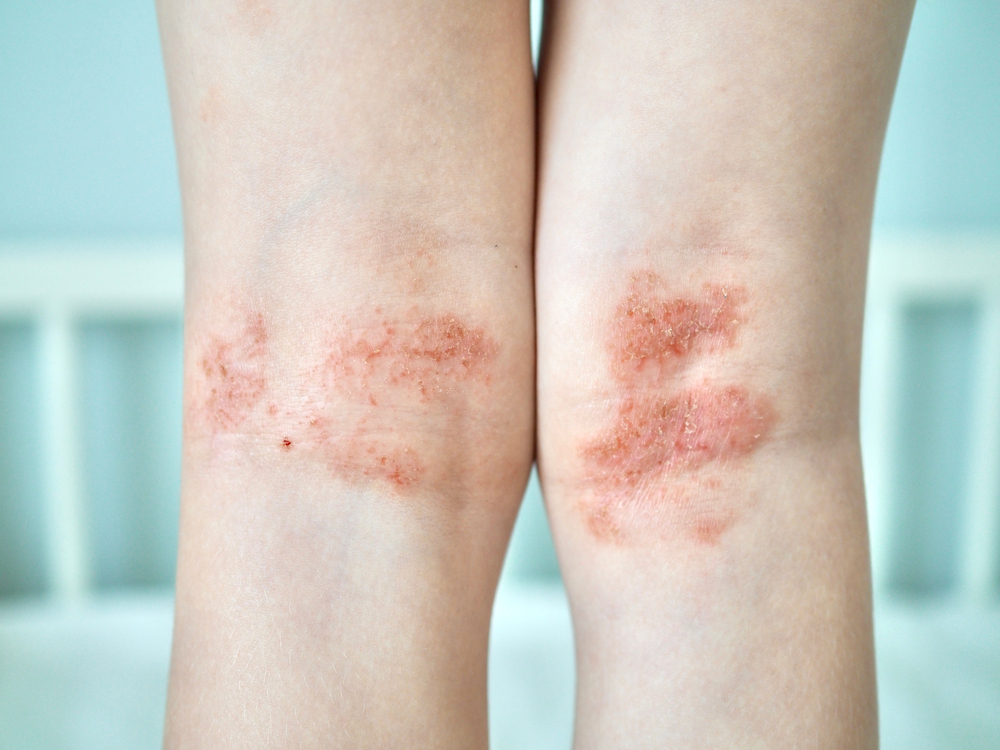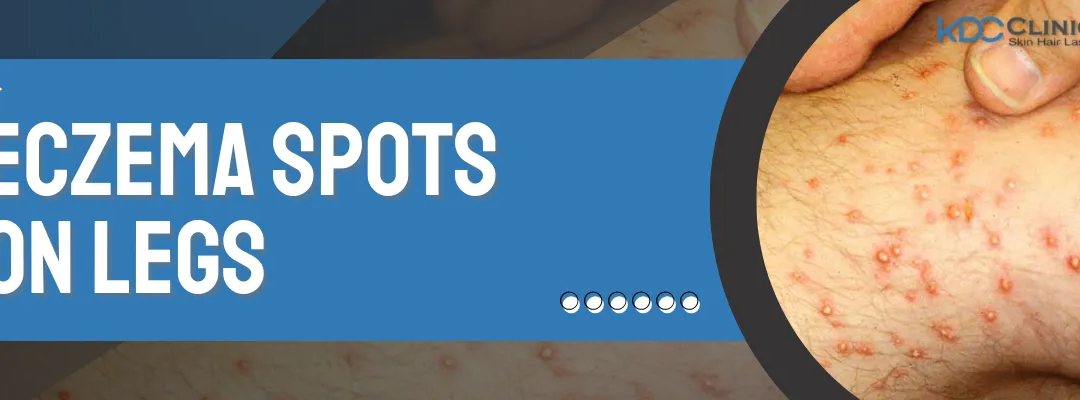Are eczema spots on your legs causing you discomfort and concern? If you’ve been grappling with the challenges of this skin condition, you’re not alone. Dr. Archit Aggarwal, a trusted dermatologist in Faridabad, understands patients’ concerns when dealing with eczema.

At KDC Skin Clinic in Faridabad, Dr. Archit Aggarwal offers specialized treatments for managing eczema symptoms like itching or redness and enhancing the skin’s appearance.
Let’s learn about managing and relieving eczema concerns. Your path to healthier, more comfortable skin starts here.
First, let’s see various forms of eczema and their unique characteristics.
Common Types of Leg Eczema
There are various forms of leg eczema. Each kind presents unique challenges, from eczema white spots on legs to dark spots. Let’s explore the common types:
1. Atopic Dermatitis:
- Often genetic
- Itchy, inflamed skin
- Common in families with a history of allergies
2. Contact Dermatitis:
- Triggered by irritants or allergens
- Rash develops at the site of contact
- Common culprits include soaps, detergents, and certain fabrics
3. Nummular Eczema:
- Circular, coin-shaped lesions
- More common in colder months
- Often related to dry skin
4. Stasis Dermatitis:
- Associated with poor circulation
- Swelling, redness, and itching
- Common in individuals with varicose veins or circulation issues
5. Dyshidrotic Eczema:
- Small, itchy blisters on fingers and soles
- Aggravated by stress or exposure to certain substances
- Common in individuals with a history of allergies or Asthma
Understanding these types is crucial for effective management. Always consult the best dermatologist in Faridabad, like Dr. Archit Aggarwal, for personalized advice based on your situation.
Schedule an appointment with Dr. Archit Aggarwal. Reclaim the health and vitality of your skin. Your journey to smoother, itch-free legs begins now!
Let’s know the reasons behind those eczema circles on legs or round itchy patches.
What Causes Eczema Spots on Legs?
Eczema dark spots on legs can arise due to various factors. Here’s a quick breakdown:
1. Genetics:
- Inherited factors play a significant role.
- Family history often contributes to eczema development.

2. Immune System Response:
- Overactive immune responses trigger skin inflammation.
- This can result in the manifestation of eczema spots on legs.
3. Environmental Triggers:
- Allergens and irritants like soaps or fabrics can exacerbate eczema.
- Identifying and avoiding these triggers is crucial for management.
4. Dry Skin:
- Lack of moisture is a common eczema catalyst.
- Regular hydration helps maintain skin integrity.
5. Microbial Infections:
- Bacterial, viral, or fungal infections may aggravate eczema.
- Proper hygiene reduces the risk of secondary infections.
6. Stress:
- Emotional stress can worsen eczema symptoms.
- Managing stress through relaxation techniques is beneficial.
Understanding these factors is crucial in effectively managing and preventing eczema spots on the legs.
Discover actionable strategies and treatments to alleviate eczema dots on legs.
What are the Treatment Options for Eczema Spots on Legs?
Dealing with eczema spots can be a bothersome journey. But fret not. There are effective methods for treating the round itchy patch on leg. Here’s a quick rundown on managing those pesky spots:
1. Moisturize Regularly:
Keep your skin hydrated with fragrance-free moisturizers. This helps create a protective barrier against irritants.
2. Topical Steroids:
Your dermatologist may prescribe mild to moderate topical steroids to reduce inflammation and itching.
3. Avoid Triggers:
Identify and avoid triggers like certain fabrics, soaps, or specific foods that may worsen your eczema.
4. Cool Compresses:
Ease the itch by applying cool compresses to affected areas. This can provide quick relief and soothe irritated skin.
5. Prescription Medications:
In severe cases, your dermatologist might recommend oral medications to manage symptoms. These may include antihistamines or immunosuppressants.
6. Wet Wrap Therapy:
For intense hydration, wet wrap therapy can be beneficial. It involves applying a damp layer over topical treatments to enhance absorption.
“Remember, every individual is unique. So, what works for one may not work for another. Consult a seasoned skin specialist for treatment plans tailored to your needs,” advises Dr. Archit Aggarwal.
Are you seeking safe and effective eczema treatment in Faridabad? Schedule an appointment with Dr. Archit Aggarwal today. Take the first step towards healthier skin.
Learn proactive steps to prevent eczema spots from flaring up on your legs.
How to Prevent Eczema Spots on Legs?
Preventing eczema spots on legs is within your reach. Follow these simple steps to keep your skin healthy:
1. Hydration Matters:
Keep your skin well-hydrated to prevent eczema flare-ups on your legs.
2. Gentle Cleansing:
Use mild, fragrance-free cleansers to avoid skin irritation.
3. Moisturize Regularly:
Apply a hypoallergenic moisturizer to lock in moisture and create a protective barrier.
4. Avoid Triggers:
Identify and steer clear of potential triggers like harsh detergents or allergens.
5. Cool Showers Rule:
Opt for lukewarm showers instead of hot water to prevent skin dryness.
6. Loose Clothing Choice:
Wear loose-fitting, breathable fabrics to minimize friction and irritation.
7. Mind Your Diet:
Incorporate skin-friendly foods. Consider allergen-free options if needed.
8. Mindful Shaving:
If you shave your legs, do so carefully. Use a sensitive skin shaving cream. Sharp, clean razors can reduce irritation.
9. Stay Stress-Free:
Manage stress through relaxation techniques, as stress can exacerbate eczema.
Should I see a Doctor for Leg Eczema?
Consulting a dermatologist is a wise decision if you have persistent eczema. Here’s why:
1. Accurate Diagnosis:
A dermatologist can provide a precise diagnosis. This is crucial for effective treatment.
2. Personalized Treatment Plan:
Every case is unique. A doctor tailors a plan specifically for you, ensuring optimal results.
3. Prescription Medications:
Severe cases may require topical steroids or other prescribed medications. Only a doctor can provide these.
4. Preventing Complications:
Untreated eczema can lead to complications. A doctor can help prevent potential issues and ensure healthy skin.
5. Identify Triggers:
A medical expert can help identify potential triggers. They can also suggest lifestyle changes to minimize flare-ups.
Don’t let leg eczema linger – schedule a consultation with Dr. Archit Aggarwal for personalized care and a path to clear, healthy skin! Your skin deserves the best care!
Conclusion
Personalized care is crucial for managing eczema spots on the legs. Dr. Archit Aggarwal, an esteemed dermatologist in Faridabad, advocates for a tailored approach to address individual concerns effectively.
Remember, treating eczema is not a one-size-fits-all process. Seek expert guidance for specialized advice tailored to your unique needs. Your path to healthier, eczema-free legs begins with personalized care.
Get answers to common queries on eczema spots on legs in our FAQs section.
Frequently Asked Questions:
1. How long do eczema spots last?
Eczema spots’ duration varies. But with proper care, most cases improve within a few weeks. Dr. Archit Aggarwal recommends consistent skincare to quicken the healing process.
2. Is eczema serious?
While eczema isn’t life-threatening, it can impact your quality of life. It’s crucial to seek medical help to manage symptoms effectively and prevent complications.
3. How do you stop eczema from spreading?
Preventing eczema spread involves:
- regular moisturizing
- avoiding irritants
- identifying triggers
Dr. Aggarwal advises a proactive skincare routine to curb flare-ups and maintain skin health.
4. What foods to avoid if you have eczema?
Certain foods like dairy, nuts, and processed items may trigger eczema. Dr. Aggarwal suggests an elimination diet under supervision to identify personal triggers and alleviate symptoms.
5. How can I relieve eczema itching?
To relieve eczema itching, Dr. Archit Aggarwal recommends:
- using gentle moisturizers
- avoiding hot showers
- using cool compresses
Consult for personalized strategies to soothe discomfort effectively.
6. Can stress worsen eczema?
Yes, stress can exacerbate eczema. Dr. Aggarwal recommends stress management techniques, such as meditation and mindfulness, to complement skincare for optimal results.

